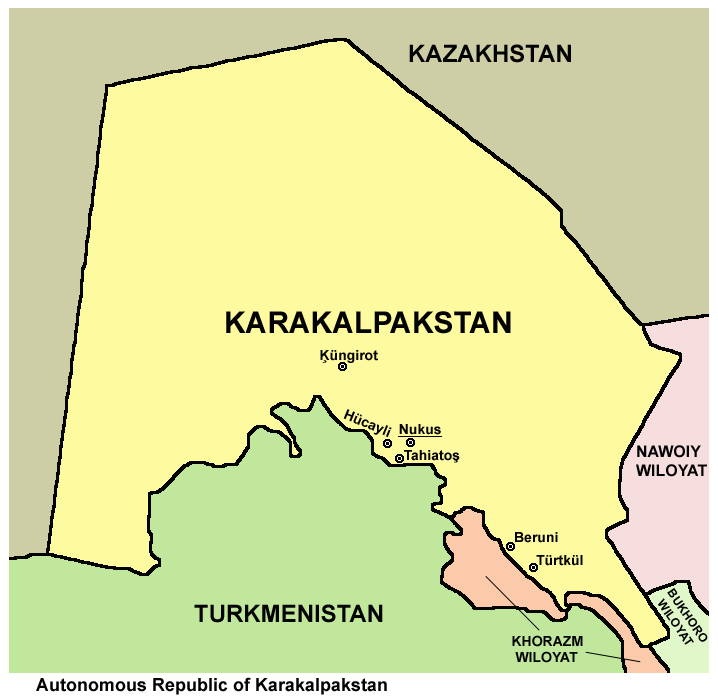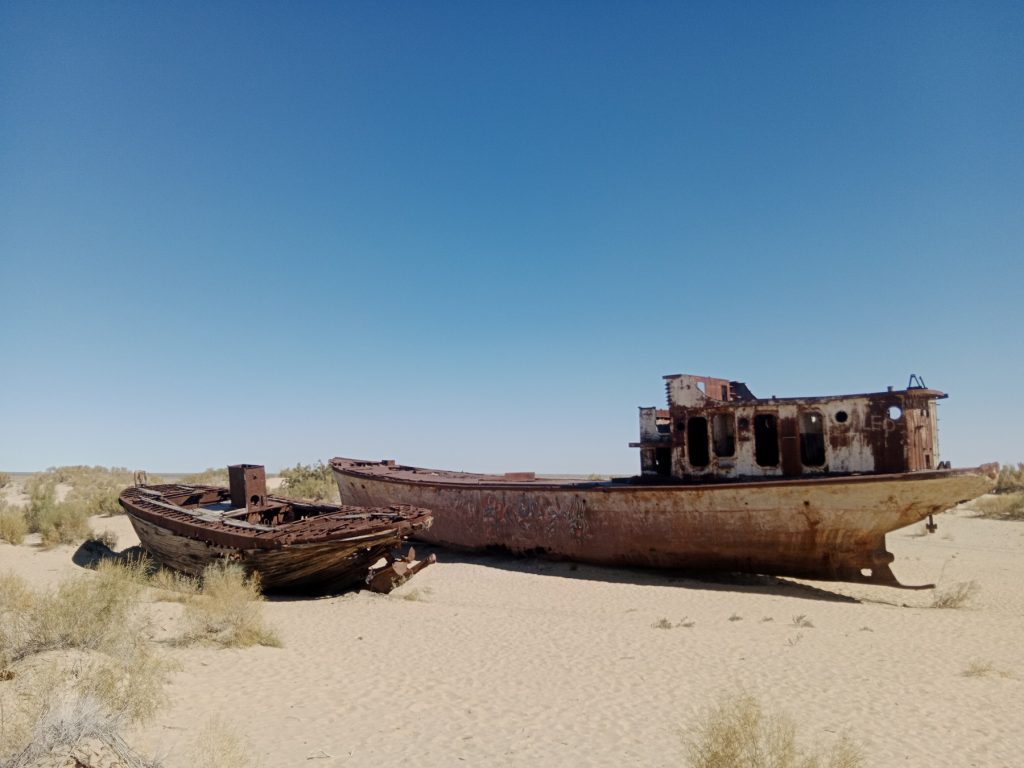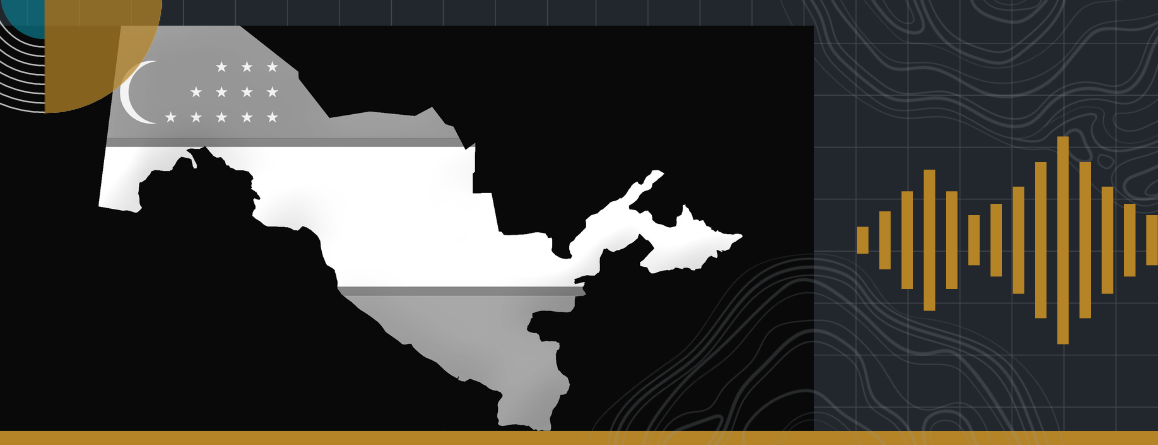In 2022, residents of Nukus, the capital of Uzbekistan’s autonomous Republic of Karakalpakstan, protested a proposed change to the Uzbek constitution that would have removed their right to secede. They succeeded—but now, in retaliation, the Tashkent government is jailing local activists and stifling free speech.
My first encounter with Karakalpak identity was superficial.
In late September last year, the four of us were sitting in the Dawlet café in Muynak, on the street leading to the Aral Sea monument, then to the ship graveyard for which the town is famous, and then to the Aralkum desert. I had taken a Czech motorcyclist I had met outside the hostel with me, a Spanish tourist I had met the day before on the street invited me, and the Spaniard was brought to the pub by his local host. After his third beer, the motorcyclist went back to his place, and the Spaniard fell in love with one of the waitresses and decided that despite his language barrier, he had to tell her this information. So I sat alone with the local and listened to his stories: about the omnipresent dust, about how many people were leaving for Kazakhstan or Russia, about the lack of work. I remembered the oil rigs I had seen the day before, driving through the lunar landscape to the shores of the dwarfed Aral Sea, and asked,
“Isn’t there work in the gas sector?
” “There is, but it’s for Uzbeks and Tajiks.”
“And you’re not Uzbek by any chance?”
“No, I am,” he straightened proudly, “a Karakalpak.
That was it. I asked, but he didn’t want to talk about the Karakalpaks: neither about his life as a minority in Uzbekistan, nor about the actions of the central government in Tashkent towards his community, nor about his attitude towards that government. He finished his beer and left, which in retrospect seems like the only sensible decision. There is no shortage of those who used the freedom of speech guaranteed by the Uzbek constitution too liberally in prisons today.
Devoted to Cotton
For years, Karakalpakstan – an autonomous republic occupying the entire western part of the country, inhabited by the Karakalpaks (a Turkic people more similar to Kazakhs than Uzbeks) – was mentioned in the Western media mainly in the context of the Aral Sea disaster. In the 1960s, Soviet planners decided that Uzbekistan, a country doubly landlocked and facing huge water shortages, would become one of the global leaders in cotton production. The waters of the Amu Darya and Syr Darya, two tributaries of the Aral Sea, were used to cultivate the “white gold”. The reservoir began to dry out at an alarming rate. Once the fourth largest lake in the world, it shrank by about 90%, leaving behind a salty desert and taking away the main source of income for local residents.
However, this is not why Karakalpakstan became a hot topic in July 2022. Protests broke out in Nukus, the capital of the region, resulting in 21 deaths (according to the Uzbek government – although some sources say the number of victims is several times higher) and hundreds of people were injured. Uzbekistan has not seen street riots on such a scale since 2005; then, in Andijan, in the east of the country, police opened fire on demonstrators, killing at least 187 of them.
The protests in Nukus erupted in response to the announcement of a controversial referendum project on changes to the constitution. The proposed changes extended the president’s term to seven years and “erased” the two terms of Shavkat Mirziyoyev, who had been ruling the country since 2016. However, the Nukus demonstrators were more interested in plans to abolish Karakalpakstan’s sovereignty and take away its ability to secede through a referendum.
The protests lasted only a few days: the authorities in Tashkent used armoured vehicles, rubber bullets and tear gas to suppress them, and imposed an information blockade. Mirziyoyev quickly withdrew his plans to limit the sovereignty of the Karakalpakstan Republic, blaming the “criminal element” for causing the riots. In Nukus, he announced broad public programmes aimed at combating poverty in the region. However, more than two years later, it is hard to say that he has kept this promise.
Investments instead of rights
– It is not getting any better – says Lejla Sejitbek, a lawyer and founder of Freedom for Eurasia, an organization that investigates human rights violations in Eastern Europe and Central Asia. – When we talk to people in Karakalpakstan, we hear the same complaints. They are not employed because of their origin, and Uzbeks are privileged in the fight for jobs. Karakalpaks do not see initiatives that would improve their quality of life. There are no jobs being created there, no new schools are being built.
Lack of opportunities is nothing new in Karakalpakstan. When the Aral Sea began to dry up, fishing, which was the basis of the local economy, disappeared with it. The wind began to blow dust saturated with salt and chemicals, which the receding shore exposed, exposing locals to a higher risk of lung diseases, anemia and puberty disorders. Natural gas deposits were also discovered on the former bottom of the lake, but they did not bring the expected prosperity at all. According to last year’s statistics from the Uzbek government, every fifth resident of the Republic of Karakalpakstan lives in poverty – the worst result of all regions of Uzbekistan.

The problems are to be solved by Mirziyoyev’s plan, which plans to spend around 100 billion soums (around 30 million złoty) on repairing and building infrastructure in the autonomous republic next year. The initiative will be implemented by his daughter Saida, who serves as the president’s first assistant. However, Sejitbek does not consider this a sign of good will:
– This is a display of a colonial approach. The president of Uzbekistan appoints his own daughter to deal with the development and reform of Karakalpakstan. Tashkent is preventing the inhabitants of the region from making their own decisions, taking away the chance for a meaningful participation in the social and political life of their republic. This is how the Karakalpaks will perceive it. They must be allowed to decide for themselves, to participate in the management of their territory, to take up political and administrative positions that matter. They should lead the development of their republic, says the lawyer, adding: “And development is impossible without respect for human rights.”
From the Streets to Forced Labor
These are regularly violated in Nukus. More than 500 people were arrested in the wake of the riots in Nukus, and dozens of them were brought to trial. According to the Freedom for Eurasia report, the trial was not fair: for example, recordings of some of the defendants trying to calm the crowd during the July protests were ignored. In addition, some of the confessions were obtained by putting pressure on the families of those arrested, promising lenient sentences, and even using torture. However, these reservations did not prevent the protesters from being charged with conspiring against the constitutional order of Uzbekistan and participating in mass riots.
The central figure convicted by the Uzbek authorities is Dauletmurat Tadzhimuratov, a Karakalpak activist and lawyer, who was sentenced to 16 years in prison on charges of organizing riots and conspiring to seize power in the country. Leila Sejitbek doubts, however, that the man had any ambitions to lead the July demonstrations:
“He played a very active but peaceful role in them. He spoke to people, called on them to go home and reported to the authorities a request to organize a peaceful demonstration on another day. But the authorities, fearing his position in Karakalpakstan, arrested him. This led to further protests.
Tajimaratov is currently in a high-security prison, where, according to Freedom for Eurasia, he is tortured and humiliated by guards. He is also forced to work in the production of lime. Reports from August suggest that the activist shows clear signs of lime oxide poisoning.
“He has ulcers on his skin and in his mouth, he has trouble breathing. He has lost 10, maybe 15 kilograms. He can barely walk. He can’t eat because he is constantly vomiting,” Sejitbek says. Tajimaratov received the longest possible sentence. If the conditions of his imprisonment do not change, he will not live to see it end. But this is only the top of the list of people who have been imprisoned since the protests in Nukus. Repression has also affected journalists, including Lolagul Kalykhanova (eight years suspended) and Bakhtiara Kadirbergenova (five years after an appeal), who reported on the events in July. The restrictions on media freedom in Karakalpakstan are not only related to the referendum protests. Reporters Without Borders reports, for example, on the cases of Mustafa Tursynbayev and Salamat Seitmuratov, who investigated illegal logging for rice fields.
Prison for inappropriate conversations
The authorities are strengthening the communicational oppression in the region. Sejitbek claims that there is simply no independent media in the autonomous republic today. But even people who are not politically involved cannot feel safe here. After the events of two years ago in Karakalpakstan, it is enough to use the internet carelessly to find yourself on the authorities’ radar.
“We receive reports of arrests for following and commenting on social media. There were also financial penalties, which are unbearable for people, because the economic situation is already dramatic. If someone cannot afford to meet their basic needs, how can you expect them to pay a fine for joining a group on Telegram or Facebook?” the lawyer asks rhetorically.
The activist also claims that the authorities have spoken to students at universities to “discourage” them from “inappropriate” online activity.
– They were threatened with fines, criminal cases and expulsion from universities if anyone was caught observing any undesirable content on Telegram – she says.
Among the groups that were censored were those demanding Tadzhimuratov’s release and those gathering supporters of the independence organization Alga Karakalpakstan.
Freedom for Eurasia representatives also claim that state services are actively hindering their communication with people whose rights are being violated. First, one of the organization’s activists was denied entry to the country (after waiting more than a year for the justification of this decision, the National Security Service stated that they did not have to explain anything), and other activists were prevented from taking effective action at every turn. Lejla Sejitbek recalls a mission during which Freedom for Eurasia members wanted to talk to the families of the victims of the protests in Nukus:
– It was complete chaos. Our group was followed by some people, standing outside the houses we visited. Some people refused to meet with us precisely because of the surveillance. We talked to others anyway, but they told us that they had been visited by officers of the secret services and the police, telling them not to contact not only us, but also any human rights organizations.
Uzbekistan Beyond Borders
Many Karakalpakstan activists have decided to operate outside the country. Among them is Amanbay Sagidulayev, the leader of Alga Karakalpakstan, who has been granted asylum in Norway. Three other activists – Koskarbay Toremuratov, Naurybay Menlibayev and Karlibay Bekmuratov – are currently waiting for a similar decision in Poland. But even politically active Karakalpaks who have been living outside Uzbekistan for years are receiving long-term sentences in absentia for “orchestrating” the protests in Nukus, and family members who remained in the country are being used to exert pressure.
“Against those who are beyond their reach, the Uzbek authorities use Interpol and the extradition procedure, fabricating charges. Just as they have been doing for a long time,” says Sejitbek.
Leaving the country is not easy either, because although in theory every citizen of Uzbekistan has the right to obtain a passport, in practice officials can arbitrarily decide that someone should not travel abroad. This is what happened to many Karakalpak activists and their families.

Autonomy remains
The landscape in the Republic of Karakalpakstan after the protests of two years ago is therefore even darker than it was then. The actions of the authorities after the events in Nukus are like a bucket of cold water on the heads of those who hoped that after the death of long-time president Islam Karimov and his replacement by Mirziyoyev, Uzbekistan would become a country at least striving for democracy. For Karakalpakstan, the right to secession guaranteed by the constitution seems more distant than ever; the region is a rich source of raw materials, even if this is not visible in the economic situation of its inhabitants, and it is simply too valuable to the central authorities. Tashkent continues to keep its hand on the throat of the autonomous republic in the west of the country and does everything to avoid attracting the attention of the world. In July 2022, this did not work out. And in this, Lejla Sejitbek sees a glimmer of hope.
– For many years, the international community did not notice the Karakalpaks and their situation amidst all the human rights violations in Uzbekistan. The fact that the protests and what happened after them, i.e. persecution, arrests, repression outside the country, were described by human rights organizations and journalists around the world, gave the people of Karakalpakstan a platform, thanks to which their voices were heard. Now they feel more confident, they know that they must continue to fight to save their language and culture, fight for their rights, for their own representatives in parliament, who in turn will fight for their interests.
Another referendum to remove the provisions that gave the republic at least a theoretical chance to secede is hard to imagine at the moment. Mirziyoyev achieved his most important goal – he “zeroed out” his presidential terms and enabled himself to remain in office until 2037, when he will be 80 years old. Memories of the protests in Nukus are too fresh to risk another escalation of the situation. For now, it looks like the autonomous republic will remain in the same limbo as before: relative sovereignty on paper, a parliament without much decision-making power, and vague promises of development. However, this state cannot last forever.
– I am not sure if Mirziyoyev understands this, but he really has no other choice than to try to find some kind of compromise with the Karakalpaks – sums up Lejla Sejitbek. – Because the issues that people are asking for are quite simple. They want to have rights as a minority, they do not want to be discriminated against. They want to be provided with equal treatment on their territory, in their own homeland.
Jakub Mirowski – Turkish philologist, journalist. He studies the impact of global climate change on the most endangered communities.
